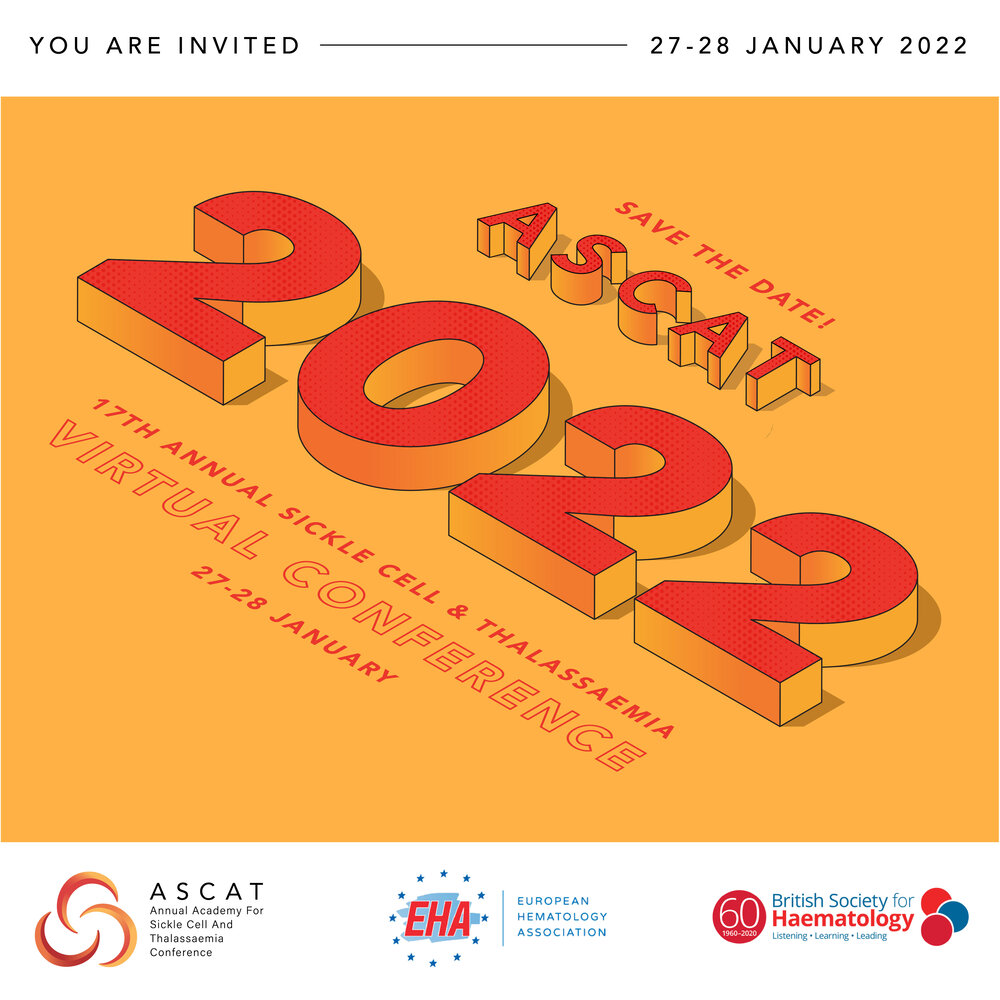EDUCATION & TRAINING
The Annual Scientific Conference on Sickle Cell and Thalassemia
The Annual Scientific Conference on Sickle Cell and Thalassemia (ASCAT) is one of the must attend events of the year for consultants and specialist psychologists, nurses, scientists and all relevant experts.
The event is an ideal opportunity to see the latest advances in diagnosis, treatment and emerging fields in haemoglobinopathies. It is an opportunity to interact on the latest advances in clinical care, transition services and emerging new therapies including updates for curative treatment options.
ASCAT 2020

Also in 2020 ARISE supported The Annual Scientific Conference on Sickle Cell and Thalassaemia – ASCAT 2020, that was held from 26th to 31st October in close collaboration with the European Heamatology Association(EHA) and the British Society of Haematology (BSH).
Due to the COVID-19 pandemic an online virtual programme of events was held with a face to face element in the final days.
This year’s conference may in time turn out to provide a new and improved forum to come together to share best practice and develop strategies for the future.
The theme is ‘Haemoglobinopathies: Emerging Challenges and Future Therapies’, that reflects the rapid progress in research for new drug therapies and curative therapies. A number of FDA approvals and other national approval process are at different stages.
Considering that the majority of patients with Sickle Cell Disease and Thalassemia live in low resource settings, these new therapies may not be readily accessible or affordable. Therefore, our attention needs to be refocused to improve newborn screening and comprehensive care, hydroxyurea therapy, blood transfusion and effective iron chelation.
Here following some useful material about ASCAT 2020:
- Conference programme: Day 1, Day 2, Day 3, Day 4, Day 5, Day 6
- Summary of the proceedings
- Closing remarks from Professor Baba Inusa, founder of the ASCAT Conference
ASCAT 2022

In collaboration with European Hematology Association & British Society for Haematology, ASCAT presented: “Improving the lives of people living with Sickle Cell Disease and Thalassaemia: a focus on new therapies and person-centered care” held from 26th—28th January 2022.
The event attracted over 300 individuals who listened to over 80 different sessions ranging from abstracts, live lectures and patient sessions. Highly skilled faculty brought in their wealth of experience in their respective topics.
Here following two educative contributions shared by relevant experts in the field during the event:
- New therapies – part 1, part 2 (lectures by Dr Julie Kanter and Dr Biree Andemariam, Dr Bart Biemond, Roanna Maharaj, Dr Salam Akindi, Dr Jo Howard and Dr Julie Makani)
- Facilitating Shared Decision-Making Between Providers and Families of Youth with Sickle Cell Disease by Dr Lori Crosby
- An EU-ARISE initiative gap analysis approach to improving the quality of laboratory systems ins Sub-Saharan Africa by Dr Wale Atoyebi
- Content stored online, has keywords or clustered in webpages to allow search for topics and for audiences
- PDF text https://www.cdc.gov/ncbddd/sicklecell/materials/factsheets.html https://www.cdc.gov/ncbddd/sicklecell/healthyliving.html https://www.cdc.gov/ncbddd/sicklecell/traits.html
- Pictures and infographics
- Videos? Podcasts?
- PowerPoint presentations
- https://targethiv.org/
- https://hab.hrsa.gov/about-ryan-white-hivaids-program/part-f-aids-education-and-training-centers-aetc-program
- https://sickleemergency.duke.edu/educational-resources/short-presentations-online-learning
- http://www.bioethicsinstitute.org/research/projects-2/hope/sickle-cell-disease-facilitators-guide
- Clinical guidelines and Model programs for specific clinical scenarios – these can be presented in different ways but I really like the HIV/AIDS Bureau examples.
- https://hab.hrsa.gov/clinical-quality-management/clinical-care-guidelines-and-resources
- https://hab.hrsa.gov/about-ryan-white-hivaids-program/spns-workforce-building
- https://hab.hrsa.gov/about-ryan-white-hivaids-program/special-projects-national-significance-spns-program-initiative-products
- https://hab.hrsa.gov/sites/default/files/hab/Publications/careactionnewsletter/june2011.pdf
- https://hab.hrsa.gov/publications/library/2013-hiv-continuum-care-tennessee
- Clinician training video https://sickleemergency.duke.edu/educational-resources/videos
- Download modules of materials
Your content goes here. Edit or remove this text inline or in the module Content settings. You can also style every aspect of this content in the module Design settings and even apply custom CSS to this text in the module Advanced settings.